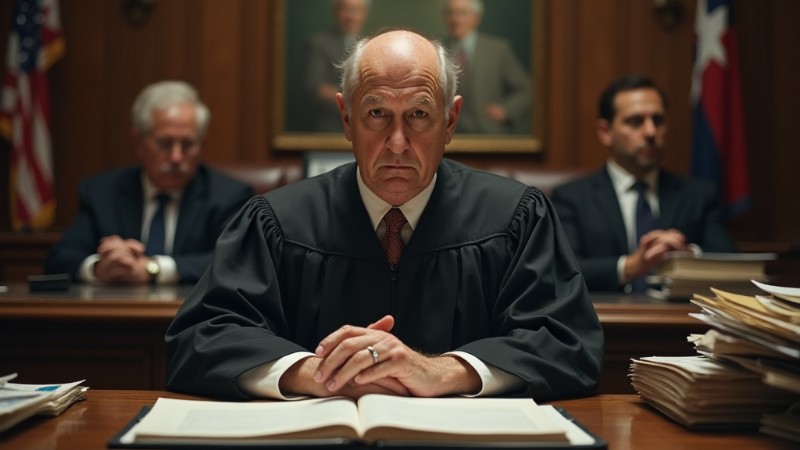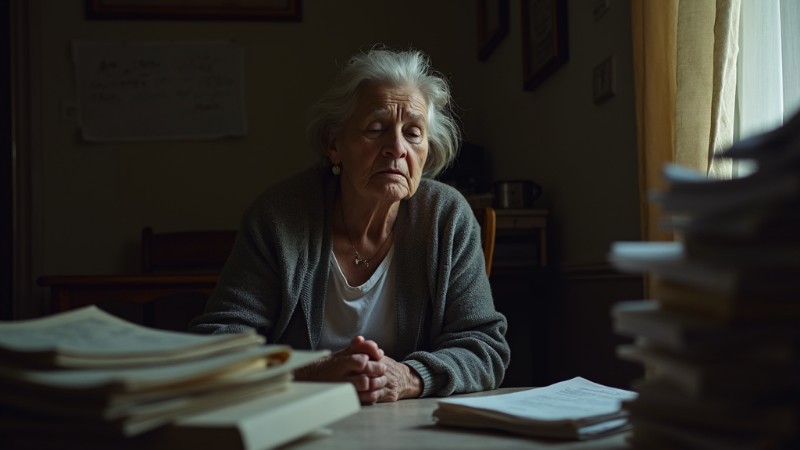Recent issues have highlighted big questions about Texas Supreme Court Justice John Devine’s role in managing the trust and guardianship of Elvie Kingston, a 76-year-old millionaire with dementia.
This situation is raising eyebrows not just about a judge’s involvement with a non-family member’s estate, but also about bigger issues like elder law, legal ethics, and the duties of a fiduciary. The mix of these legal and ethical matters shows how vital it is to protect vulnerable people like Kingston from possible exploitation.
Key Takeaways
A Texas judge’s involvement in managing a senior dementia patient’s trust has raised concerns about conflicts of interest, elder law, and legal ethics.
- Justice John Devine’s role as trustee for Elvie Kingston’s trust raises questions about whether he is breaking Texas’s ethical rules for judges due to his close relationship with Kingston.
- The case highlights the need for stronger safeguards against financial exploitation of elderly individuals, particularly when judges are involved in managing their trusts and estates.
- There is a growing concern that guardianships can be abused without proper oversight and transparency, leading to situations where an individual’s wishes are disregarded and their assets are misused.
Justice Devine and the nature of the trust
Back in 2007, Elvie Kingston set up a trust with John Devine named as the sole trustee. This would happen if Kingston or her husband passed away or became unable to make decisions. John Devine, a well-known conservative in Texas, had known Kingston for years through local politics. Devine’s kids even called her “G-ma,” and Devine says Kingston thought of him as family.
But when Kingston’s mental health started to go downhill in the early 2020s, people began to worry if Devine’s personal ties were affecting his role as trustee. In 2022, her niece, Michelle Hartman, filed a complaint, claiming Devine’s role clashed with the Texas Code of Judicial Conduct. This code says judges can’t be trustees for people who aren’t family. Hartman and some of Kingston’s old friends said Kingston didn’t trust the Devines and wanted her niece to handle things.
Devine Injustice
Texas Supreme Court Justice John Devine and his wife are being accused of taking financial advantage of an elderly woman who is incapacitated – stricken with dementia.
Her family says the judge on the state’s highest court refuses to let them see her, or… pic.twitter.com/S7t6Pf8F90
— Dolcefino Media (@WayneDolcefino) February 19, 2024
The trust is quite valuable, including monthly oil royalties, and gives the trustee a lot of say over how Kingston’s money is spent for her care. Some legal experts believe this could create a conflict of interest for Devine, raising questions about whether he’s breaking Texas’s ethical rules for judges.
Judicial ethics under scrutiny
The Texas Code of Judicial Conduct clearly says judges shouldn’t act as trustees, executors, or fiduciaries for anyone who’s not family. This rule exists to avoid conflicts of interest and to keep public trust in judges. Yet, Justice Devine claims his close relationship with Kingston, whom he sees as family, means he doesn’t have to follow this rule.
But, legal experts don’t agree with Devine’s view of the rules. Heather Zirke, who specializes in judicial ethics, notes that the rules are there to prevent even the appearance of doing something wrong.
By acting as trustee for Kingston’s trust, Devine risks losing public confidence in judges. His dual role could lead to conflicts of interest. Experts argue that letting a judge decide who’s “family” undermines these rules and could lead to power misuse.
Additionally, the financial gain that the Devines might get from managing Kingston’s trust adds to the ethical issues. Although court records from 2007 don’t show the Devines as beneficiaries, their control over Kingston’s estate, along with Nubia Devine being her legal guardian, gives them significant power over her finances. This situation raises concerns about whether they’re acting in Kingston’s best interest or if they’re motivated by potential financial benefits.
The Texas Supreme Court has mostly stayed quiet on this matter, choosing not to comment on whether Devine’s actions go against the state’s judicial rules. This silence has increased public worry about possible conflicts of interest in this case and the wider effects on how judges oversee trusts and estates.
Elder law and judicial oversight
In recent years, Texas has made efforts to address the financial abuse of elderly individuals, a growing concern as the state’s population of senior citizens increases. In 2021, the Texas Legislature enacted a new law criminalizing the financial exploitation of the elderly, defined as the wrongful appropriation or exploitation of an elderly person’s assets.
This law is intended to protect elderly individuals from financial abuse by caregivers, family members, and others who have a fiduciary responsibility to manage their assets. The law outlines strict penalties for those found guilty of financial exploitation, ranging from misdemeanor charges to first-degree felonies, depending on the value of the assets involved.
While this law focuses primarily on caregivers and family members, its broader implications are directly relevant to cases like Kingston’s, where questions of financial exploitation and fiduciary responsibility are at the forefront. Legal experts argue that the safeguards established by this law should also apply to judges who are involved in managing the trusts and estates of elderly individuals, particularly in cases where there is a potential conflict of interest.
In Kingston’s case, her niece and several of her long-time friends have raised concerns about the level of care she is receiving under the Devines’ guardianship. They argue that Kingston has been isolated from her friends and family, with some individuals reporting that they have been unable to visit or communicate with her for over a year. This level of control, granted to the Devines under the guardianship agreement, has led to speculation that Kingston’s isolation is being used to prevent scrutiny of how her trust is being managed.
The issue of guardianship is particularly relevant in cases involving elderly individuals with dementia, as it raises important questions about how best to protect vulnerable individuals from financial exploitation and ensure that their wishes are respected. In Kingston’s case, the guardianship arrangement grants Nubia Devine broad authority over Kingston’s personal and financial decisions, including who is allowed to visit her and how her financial resources are used.
The case has also brought attention to the broader issue of how guardianships are managed in Texas and other states. Guardianships are intended to protect vulnerable individuals from exploitation and ensure that their personal and financial needs are met. However, without proper oversight and transparency, guardianships can be abused, leading to situations where the individual’s wishes are disregarded, and their assets are misused.
Takeaway
Going forward, there is a strong need for change and more transparency in how trusts and guardianships are managed, especially when judges are involved. The silence from the Texas Supreme Court has increased concern about justice system integrity, leading to demands for more oversight. One suggested solution is having a neutral third-party trustee manage Kingston’s trust, to avoid conflicts and ensure her finances are used for her benefit.
Besides changing rules about judges’ roles in trusts, there’s also a need to raise awareness on the risks of financial exploitation of the elderly. Families and caregivers should learn about potential abuses and what legal steps they can take to protect those who are vulnerable. By raising awareness and strengthening protections, we can prevent future cases similar to Kingston’s and make sure that elderly people receive adequate care and protection.
In conclusion, the case involving Justice John Devine and Elvie Kingston highlights the need to maintain strong standards of judicial ethics and responsibility.














